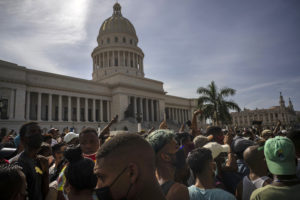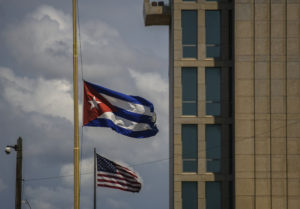By Geoff Thale and Mavis Anderson*
Recent news reports indicated that the U.S. State Department would miss the deadline for its annual terrorism report. And they noted that the State Department did not plan to use the report to remove Cuba from the list of State Sponsors of Terrorism. (Earlier this year, reports had hinted that the State Department was considering removing Cuba from the list.)
Does this mean that the administration is no longer thinking about delisting Cuba? Should those of us who support a more rational relationship between the United States and Cuba throw up our hands in despair? No and no. The President can remove Cuba from the list of State Sponsors of Terrorism at any time. In fact, few observers expected Cuba to be removed from the terrorist list this spring anyway, given the major legislative battles on immigration and gun violence prevention.
That does not mean that sensible people should not object when the report is published and Cuba is again listed as a State Sponsor of Terrorism.
Importantly, the State Department will have many opportunities over the course of the year to take the sensible step of removing Cuba from the list of State Sponsors of Terrorism. In fact, it is because of this possibility that opponents of change are working so hard to convince the administration to sit on its hands. Reps. Ileana Ros-Lehtinen, Mario Diaz-Balart, and Albio Sires recently sent a letter to Secretary of State John Kerry asking him to keep Cuba on the list.
Although some aspects of U.S. policy toward Cuba—in particular, the embargo and the travel ban—can only be changed by Congress, there are a number of meaningful actions that the Obama administration could take without waiting for Congress. Removing Cuba from the list of State Sponsors of Terrorism is one of the most significant of these.
Delisting Cuba would be an important step in the right direction: it would send a message to the Cuban government that the United States wants to improve the relationship. It could help set the stage for the kind of dialogue and negotiations that are needed to address many issues of common concern, including securing the release of USAID contractor Alan Gross, who is currently serving a 15-year sentence in Cuba. Delisting Cuba would also send an important and long-awaited message to Latin American governments from across the political spectrum. Both publicly and privately, Latin American governments have made it clear to the Obama administration that U.S. policy toward Cuba needs to change.
If the administration needed an additional reason to take Cuba off the terrorist list, Cuba’s constructive role in the Colombian peace talks provides an excellent justification for doing the right thing. Peace talks between the Colombian government (a stalwart U.S. ally and the recipient of hundreds of millions of dollars in U.S. assistance) and the FARC (the Colombian guerilla organization, which the United States has designated a terrorist organization) are currently taking place in Havana. The talks are making real progress.
Cuba’s role in the peace talks illustrates just how much times have changed. In the 1980s, Cuba supported guerilla groups who were trying to overthrow conservative governments, and the Reagan administration put Cuba on the terrorist list in 1982. But in 1992, Fidel Castro announced that Cuba’s support for armed revolution was a thing of the past, and now Cuba is encouraging one of the few remaining guerilla groups in the region to make peace with a conservative government. The Obama administration should acknowledge this profound shift by taking Cuba off the terrorist list.
Geoff Thale is WOLA’s Program Director.
Mavis Anderson is a Senior Associate for Cuba at the Latin America Working Group.


